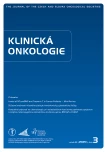-
Medical journals
- Career
Long-Term Effect of Erlotinib Therapy in the Third Line of Anticancer Treatment in a Patient with Non-Small-Cell Lung Cancer – a Case Report
Authors: Nela Šťastná; Lenka Jakubíková; doc. MUDr. Kristián Brat, Ph.D.
Authors‘ workplace: Klinika nemocí plicních a tuberkulózy LF MU a FN Brno
Published in: Klin Onkol 2020; 33(3): 226-229
Category: Case Report
doi: https://doi.org/10.14735/amko2020226Overview
Background: Malignant tumours of the trachea, the lungs, and the bronchus are the second most common type of tumour in the Czech Republic. Approximately three-quarters of cases are diagnosed in an advanced stage (IIIB–IV) and are one of the most common causes of death in all cancer groups. Targeted therapy brings a certain level of the improvement of prognostic outlook. In the Czech Republic, 1st and 2nd generation of tyrosine kinase inhibitors (gefitinib, erlotinib, afatinib) are indicated in the first-line anticancer treatment in non-small-cell lung cancer in locally advanced and metastatic stage, with proved activating mutation status of the epidermal growth factor receptor. Erlotinib is also indicated for use in the second or third line of anticancer treatment after a documented failure of previous chemotherapy.
Case: A 70-year-old patient with lung adenocarcinoma, sensitive mutation in exon 19 of epidermal growth factor receptor gene, clinical-stage IV (according to the 7th edition of TNM classification), demonstrating long-term stable disease on erlotinib treatment after first-line gefitinib failure and second-line carboplatin-bevacizumab-paclitaxel combination chemotherapy failure. The disease treated with erlotinib has been stable for 48 months, although the dose has been reduced to 100 mg per day due to side effects (rash).
Conclusion: While the efficacy of a gefitinib treatment in this case report was comparable to clinical trials results, the progression interval in this particular patient when treated with erlotinib is about 5 times longer compared to the progression observed in clinical trials. Another interesting fact is also a significant difference in the effect of these two tyrosine kinase inhibitors, which have shown comparable efficacy in clinical trials.
Keywords:
Tyrosine kinase inhibitors – targeted therapy – adenocarcinoma of lung – erlotinib – gefitinib
Sources
1. Bray F, Ferlay J, Soerjomataram I et al. Global cancer statistics 2018: GLOBOCAN estimates of incidence and mortality worldwide for 36 cancers in 185 countries. CA Cancer J Clin 2018; 68 (6): 394–424. doi: 10.3322/caac.21492.
2. Novotvary 2016 ČR. [online]. Dostupné z: https: //www.uzis.cz/category/tematicke-rady/zdravotnicka-statistika/novotvary.
3. Incidence a mortalita – vývoj v čase. [online]. Dostupné z: https: //www.uzis.cz/category/tematicke-rady/zdravotnicka-statistika/novotvary.
4. Kim ST, Uhm JE, Lee J et al. Randomized phase II study of gefitinib versus erlotinib in patients with advanced non-small cell lung cancer who failed previous chemotherapy. Lung Cancer 2012; 75 (1): 82–88. doi: 10.1016/j.lungcan.2011.05.022.
5. Cohen MH. FDA drug approval summary: Gefitinib (ZD1839) (Iressa (R)) tablets. Oncologist 2003; 8 (4): 303–306. doi: 10.1634/theoncologist.2010-0257.
6. Mok TS, Wu YL, Thongprasert S et al. Gefitinib or carboplatin-paclitaxel in pulmonary adenocarcinoma. N Engl J Med 2009; 361 (10): 947–957. doi: 10.1056/NEJMoa0810699.
7. Rosell R, Carcereny E, Gervais R et al. Erlotinib versus standard chemotherapy as first-line treatment for European patients with advanced EGFR mutation-positive non-small-cell lung cancer (EURTAC). A multicentre, open-label, randomised phase 3 trial. Lancet Oncol 2012; 13 (3): 239–246. doi: 10.1016/S1470–2045 (11) 70393-X.
8. Lim SH, Lee JY, Sun JM et al. Comparison of clinical outcomes following gefitinib and erlotinib treatment in non-small-cell lung cancer patients harboring an epidermal growth factor receptor mutation in either exon 19 or 21. J Thorac Oncol 2014; 9 (4): 506–511. doi: 10.1097/JTO.0000000000000095.
9. Yang JJ, Zhou Q, Yan HH et al. A phase III randomised controlled trial of erlotinib vs gefitinib in advanced non--small cell lung cancer with EGFR mutations. Br J Cancer 2017; 116 (5): 568–574. doi: 10.1038/bjc.2016.456.
Labels
Paediatric clinical oncology Surgery Clinical oncology
Article was published inClinical Oncology

2020 Issue 3-
All articles in this issue
- Importance of Aberrantly Activated Hedgehog/Gli Pathway in Tumour Progression
- Assessment of Quality of Life in Patients with Head and Neck Cancer
- Current Possibilities of Early Detection of Cardiotoxicity of Cytostatic Treatment
- Prognostic Survival Factors of Hepatocellular Carcinoma Treated with Transarterial Chemoembolization
- Complete Response to Chemotherapy in Metastatic Pancreatic Carcinoma Associated with Double Heterozygous Germline Mutation in BRCA2 and CHEK2 Genes – a Case Report
- Long-Term Effect of Erlotinib Therapy in the Third Line of Anticancer Treatment in a Patient with Non-Small-Cell Lung Cancer – a Case Report
- Therapy with Trifluridine/Tipiracil and Regorafenib in Patientswith Pre-treated Metastatic Colorectal Cancer – Experience from the Czech Republic
- Editorial
- Aktuality z odborného tisku
- Predstavujeme nové knihy
- Oncology in pictures
- Levels of NT-proBNP and Troponin T in Cancer Patients – Mini-Review
- Association of XPG rs17655G>C and XPF rs1799801T>C Polymorphisms with Susceptibility to Cutaneous Malignant Melanoma: Evidence from a Case-Control Study, Systematic Review and Meta-Analysis
- The Relationship of FOXR2 Gene Expression Profile with Epithelial-Mesenchymal Transition Related Markers in Epithelial Ovarian Cancer
- Clinical Oncology
- Journal archive
- Current issue
- Online only
- About the journal
Most read in this issue- Levels of NT-proBNP and Troponin T in Cancer Patients – Mini-Review
- Complete Response to Chemotherapy in Metastatic Pancreatic Carcinoma Associated with Double Heterozygous Germline Mutation in BRCA2 and CHEK2 Genes – a Case Report
- Assessment of Quality of Life in Patients with Head and Neck Cancer
- Importance of Aberrantly Activated Hedgehog/Gli Pathway in Tumour Progression
Login#ADS_BOTTOM_SCRIPTS#Forgotten passwordEnter the email address that you registered with. We will send you instructions on how to set a new password.
- Career

